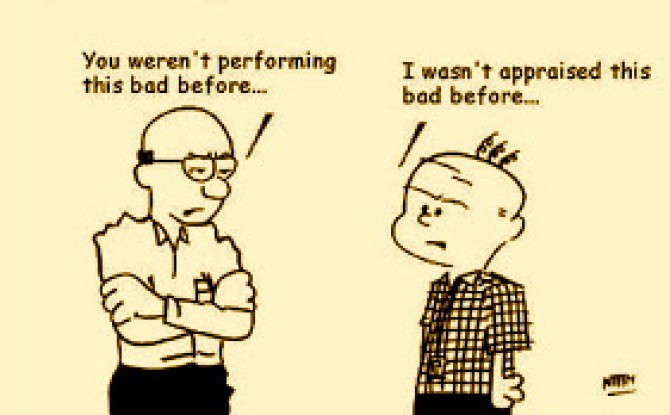We all like to know how we are doing and its human nature to want to belong.
So why do so many managers and staff, feel demotivated and quite frankly unmotivated when it comes to having an appraisal meeting?
Well could it be a number of common things? Managers feel under pressure to get through the workload possibly trying to more with less resources, could there be pressure to meet KPI’s and there is that potential of a bonus if the numbers come in! To have to spend valuable time in order to satisfy the HR managers desire to complete the appraisals on time could be being viewed as taking me away from the real job!
Members of staff may have previously had poor experiences of it being a rather one sided affair, it’s been all about let me tell you what I think and what you need to improve! Maybe it’s been such an innocuous process in the past that its relevance is in doubt, bit of a tick box exercise!
Well whatever the reason, countless surveys report the same stats, on ineffectiveness of the appraisal process and that’s a big shame. Now I am not advocating that it is only at appraisal time that a manager should acknowledge a member of staffs contribution, achievements look to identify development opportunities and set some objectives. More I am an advocate of supporting managers understand and believe that their people are the most important asset they have, they certainly believed that when they offered them a job in the first place, but all too often the creeping of complacency sets in, if I had a pound for the number of times I have heard a manger say ‘ye they are good but they know that anyway’ or ‘dam so and so, has just handed in their notice because they have another job, what am I going to do now they potentially leave in a week or a month’. I believe that line managers should be appraising and communicating daily, weekly as they go about their business, having said all that, there is a place to formally review, agree and record the period just completed, when it’s done with the right intent and delivered with compassion, creativity and courage, it is a massive engagement tool that rewards a person’s efforts and achievements, identifies their potential and sets out to support them develop to the ever changing needs of the organisation successfully.
Many managers struggle to deliver an engaging appraisal meeting. They often are under prepared, having rushed their side of an appraisal form and spending much of that time thinking of what improvements can be made in the various competencies. So preparation is key, compiling evidence as the period progresses not at the end, thinking about what the appraisee might want to get from the meeting, being more open about some of their short comings and being prepared to act on that realisation.
Often the appraising manager takes it upon themselves to tell the appraisee what they are doing wrong, an approach that is likely to get the back up of the member of staff being appraised, simply exploring through open questions being gentle in the approach often yields insights from the member of staff. Can you remember a time when you have acknowledged by yourself something that could be improved? I guess it was a lot easier to then start thinking of how you would close that gap than if someone had pointed it out to you!
Catch people doing things right! You know what you focus on increases, if you look for the error, the poor judgement call then that’s what you will find, it’s not where you find the continuous improvement culture, don’t wait until an appraisal to acknowledge what’s good and great, do that ongoing as described above, make sure they are references in the appraisal, affirmation touches the heart in toughest of characters.
Be specific when appraising both skills and behaviours. Behaviours are so important, has the organisation identified what behaviours lead to success? Are the behaviours demonstrating supporting the culture the organisation wants? Some organisations do not include behaviours in the appraisal process, this I find interesting and I believe counterproductive, its usually not skill or even knowledge in a job role that prevents highly coherent and productive teams from forming its usually attitude and behaviour that have been unattended to, not challenged and accepted.
Managers often lack skill in delivering and receiving feedback themselves. Being aware or various feedback models, knowing which may be best in which situation is easily learnt, feedback delivered unskillfully often shuts the door rather than facilitate the tentative opening that can lead to both personal and organisational gains.
Agreeing the development opportunity is only the first step, making sure the intervention is a fit for that person is critical in gaining their commitment and trust. Often statements like ‘ attend training course’ is written in the development field, I think managers need to be more creative, find out how a person best learns, what they are comfortable with, what support they would find useful from the line manager and be brave enough to challenge to use what’s best and right for a person to bridge the gap.
Finally we have to be smarter in the way we both set and schedule objectives, ‘ongoing, never works and neither does ’in x weeks’. We want to set up for success, be fair, supportive and realistic in our plans.
So what is in an appraisal? Well hopefully a conversation that two people want to have, a meeting attended with positive intent, one that is open and informative, that results in continued enthusiasm, commitment, ongoing engagement and a shared sense of purpose.
How? Well you have to want to be interested in your people! Have a good process and have access to good support resources.
Successful Appraisal Coaching Cards are available from http://www.revealsolutions.co.uk/shop-products.asp
They are suitable for all sizes of business, if you would like support in developing an appraisal process for your organisation including skills and behaviours frameworks call us NOW 07968 102578 or e mail info@revealsolutions.co.uk
Ask the right Appraisal Questions
Better Appraisals




